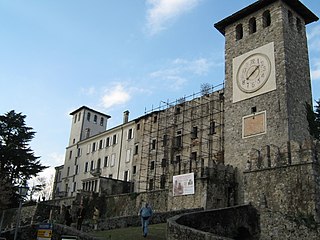Civica may refer to:
Civica may refer to:
AD 88 (LXXXVIII) was a leap year starting on Tuesday of the Julian calendar. At the time, it was known as the Year of the Consulship of Augustus and Rufus. The denomination AD 88 for this year has been used since the early medieval period, when the Anno Domini calendar era became the prevalent method in Europe for naming years.

Civic Coalition ARI, until October 2009 known as Support for an Egalitarian Republic, is a centrist political party in Argentina founded in 2002 by Elisa Carrió.

The Moderates are a centrist political party in Italy, active mainly in Piedmont, but also in Lombardy, Emilia-Romagna, Campania and Sicily. The party, whose leader is Giacomo Portas, is associated with the centrist party Italia Viva.

Magasa is a town and comune in the province of Brescia, in Lombardy in northern Italy.

The Civic Crown was a military decoration during the Roman Republic and the subsequent Roman Empire, given to Romans who saved the lives of fellow citizens. It was regarded as the second highest decoration to which a citizen could aspire. It took the form of a chaplet of common oak leaves woven to form a crown. It was reserved for Roman citizens who saved the lives of fellow citizens by slaying an enemy on a spot held by the enemy that same day. The citizen saved must admit it; no one else could be a witness.

Colloredo di Monte Albano is a comune (municipality) in the Regional decentralization entity of Udine in the Italian region of Friuli-Venezia Giulia, located about 80 kilometres (50 mi) northwest of Trieste and about 14 kilometres (9 mi) northwest of Udine.

The Daisy Civic List was a regionalist, Christian democratic, centrist Italian political party active in Trentino.
Cerialis or Cerealis is a Latin term which means "of Ceres", "pertaining to Ceres", and may refer to:

Civic Choice was a centrist and liberal political party in Italy founded by Mario Monti. The party was formed in the run-up of the 2013 general election to support the outgoing Prime Minister Monti and continue his political agenda. In the election SC was part of a centrist coalition named With Monti for Italy, along with Union of the Centre of Pier Ferdinando Casini and Future and Freedom of Gianfranco Fini.
Trentino Civic List is a Christian-democratic political party active in Trentino.
Solidary Democracy is a Christian-leftist political party in Italy.
Marcus Metilius Aquillius Regulus was a Roman senator of the second century AD. A member of the patrician order, he held the office of consul ordinarius in 157 with another patrician, Marcus Vettulenus Civica Barbarus, as his colleague.
Marcus Vettulenus Civica Barbarus was a Roman senator of the second century AD. A member of the Patrician class, he held the office of consul ordinarius in 157 with another patrician, Marcus Metilius Aquillius Regulus, as his colleague. Barbarus was also a member of the sodales Antoniniani, a religious fraternity which attended to the cult of the emperor Antoninus Pius.
Sextus Vettulenus Civica Cerialis was a Roman senator of the early second century. He was ordinary consul in AD 106 as the colleague of Lucius Ceionius Commodus. No further details of his career are attested.
Gaius Vettulenus Civica Cerealis was a Roman senator who held at least one office in the service of the emperor. He was appointed suffect consul some time between 73 and 76.
Plautia was a Roman woman of senatorial rank whom Classical scholars believe lived in the late first century and early second century AD. No direct evidence of her existence has yet been found. Ronald Syme comments about her situation, "Plautia exemplifies a common phenomenon in the history of Imperial Rome; a fragment of knowledge rescued from the waters of oblivion, but a figure of consequence in the social and political history of the time."
Lucius Sergius Paullus was a Roman senator, who was active during the reign of Marcus Aurelius. He was twice consul: the first time attested 23 September of an unknown year as suffect consul with [? Lucius Nonius Calpurnius] Torquatus Asprenas as his colleague; and as consul ordinarius for 168 as the colleague of Lucius Venuleius Apronianus Octavius Priscus.
Titus Flavius Boethus was a Roman senator, who was active during the reign of Marcus Aurelius. He is known as being an acquaintance of the physician Galen. Boethus was suffect consul in one of the nundinia falling in the later half of 161 with [? Julius] Geminus Capellianus as his colleague.
Gaius Minicius Italus was a Roman eques who flourished during the reign of the emperors Vespasian, Domitian, and Trajan. He was appointed to a series of imperial offices, both military and civil, culminating with praefectus or governor of Roman Egypt.
Vettulenus is an ancient Roman nomen gentilicium. Notable people with this nomen include: